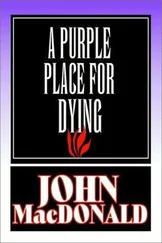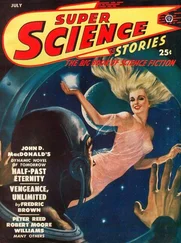“I guess you have to expect...”
“Pressure through jobs, neighborhoods, clubs, even churches, Jimmy. It makes you feel so darn helpless...” Her face twisted and she took one faltering step toward him. She stopped and straightened. “Whoa, girl,” she said. She shook her head and turned away, her eyes shiny.
“Just eleven days to go,” he said.
“I’ll make it,” she said. “I may never be the same, but I’ll make it.” The phone began to ring again. It rang fourteen times and stopped. “My public,” she said.
He phoned her at the Sinnat house at eight that evening to tell her that Doctor Sloan had seen no reason to take Doris Rowell in for treatment. She seemed rational, even though her responses were sluggish. He had arranged for a woman to move in with her for a few days and clean the place up. He would stop again and see how she was coming along. He guessed that she would continue to follow the same pattern for a while, eating a great deal and sleeping a great deal. Some people responded to emotional shocks in that manner. She was, of course, overweight, but otherwise in reasonably good physical condition. She was dulling her mental responses by overworking her belly. In her own time she would begin to eat more moderately. Then she might be willing to talk about what was bothering her. But by then, of course, it would be of merely academic interest.
Kat seemed relieved. She told Jimmy that when Tom had phoned her at seven, he had been able to reach but four of the people on Doris’ list. They had all been polite and evasive. They all pleaded other obligations, said it had really been very short notice, and had wished him the best of luck.
He told her that Wallace Lime had stopped at the newspaper office with a statement, and Borklund was going to publish it. It announced that Wallace Lime Associates had severed its connections with Save Our Bays, Inc., due to previous professional commitments.
“The louse!” Kat said.
“If it wasn’t going in as a news item, he’d have put it in as an ad. Don’t be surprised if Borklund has somebody fatten it to the point where he can run it under a three-column head.”
“It would be very difficult to surprise me with anything lately. Almost impossible, Jimmy.”
“Just for the hell of it, please don’t go anywhere alone after dark, Kat. Don’t open a door for anybody you don’t know. Okay?”
“Where am I living, Jimmy? South Palm City, or East Berlin?”
“Take care.”
“Sure. Sure, Jimmy. Thanks.”
That night he bought a bottle on the way home. He sat in his sling chair on his dark back porch with the bottle and a bowl of ice until the world was tilted at a sickening angle. But he still saw the red jam and the dead fish. It was raining hard when he blundered off the porch into the yard in his underwear shorts and clung to the rough trunk of a cabbage palm and threw up. He stayed out in the rain until his head began to ache, and then he dried himself off and went to bed, remembering how Charity had stood out on his porch in the rain, crying. There was something wrong with the memory. As he slowly took it apart to see what was wrong with it, he remembered that it had been Mitchie McClure who had made squeaking sounds in the rain, not Miss Charity Holmes of Las Vegas, and not one of the sisters-in-law of Commissioner Bliss, and not the white silent thing in the bed up at Oklawaha, with the tubes in it.
The phone awakened him at seven. He had the feeling it had been ringing for a long time. He could not comprehend who was speaking to him for several moments, and then he realized it was Dr. Freese phoning from Oklawaha to tell him that Mrs. Wing had passed away at 5:25 A.M.
“Are you there, Mr. Wing?”
“Yes. I’m here.”
“We have an autopsy permission in the file. We’d like to release the body to whomever you designate no sooner than tomorrow afternoon, say by four o’clock.”
“What’s today?”
“Sunday the sixteenth, Mr. Wing.”
“Tomorrow, eh. Well. Okay. There’s stuff of hers there.”
“It will be packed and ready, of course.”
“I... I just can’t think of anything to ask you or tell you, Doctor.”
“There isn’t much to say, actually.”
“I should say thanks for all you’ve done for her.”
“There wasn’t much anybody could do, Mr. Wing.”
He sat by the phone in the early-morning living room for several minutes. He rolled a sheet of paper into the typewriter and wrote: “Gloria Maria Mendez Wing — Born May 1, 1931—Married to James Warren Wing June 20, 1950. Died July 15, 1961, at Oklawaha State Hospital after a long illness. Mrs. Wing was born in Tampa and educated in the public schools of that city. She is survived by her husband, employed by the Palm City Record-Journal , and by her sister, Mrs. Andrew McGavern of Toronto, Canada. She was O God such a beauty at nineteen she could spin your heart with a glance...”
He went back and x’ed out the last sentence, left the paper in the machine and took a long cool shower, shaved, dressed, put coffee on and started making phone calls. To his sister, to the newsroom, to Toronto.
Teresa, Gloria’s elder sister, understood at once. Grief thickened her voice. “Ah, the poor thing. The poor damn lost thing.”
“Are you going to want to come down? I haven’t made any arrangements yet.”
“Down? How could I get down there? Are you out of your mind?”
“I had to ask you. I had to know.”
“I said goodbye to my sister two years ago. She looked at me just once, and called me mama. I can’t come way down there.”
“Teresa, there’s people in Ybor City who should know, aren’t there? I don’t know who they are. Can you let them know?”
“I can do that, yes. But when I let them know, I should tell them about the burial. What do you plan?”
“Should it be in Ybor City?”
“For what? She can’t be buried from the church. You know that. She gave up the church for you. She gave up a lot of things for you, Jeemy.”
“Look. Let’s not get into that kind of stuff.”
“It doesn’t bother you. No. Nothing bothers you. The way you treated her when she was sick.”
“Nobody knew she was sick then, damn it!”
“Poor little thing. She didn’t know what was happening.”
“Cut it out, Teresa!”
“So bury her down there. Why not? What difference does it make? You have a place in a cemetery?”
“Yes. Look, Teresa. I’ll phone you again about time and place and so on when I get things arranged.”
“Yes, you do that, Jeemy. And you make me one promise. When you call me again, it’s the last time forever. Okay? I want to forget you’re alive on the same earth. Now she’s gone, you’re nothing to me. Claro? ”
“Si, seguro. Muchissima’ gracia’.”
The good connection faded suddenly. Her voice was frail and remote. “But I want the pin. You hear me? I want the pin with the pearls. It was never yours. You hear me?”
He hung up. It was eight-thirty. The coffee was tepid. He poured it back into the pot. He looked up the number for the Shackley Funeral Home and asked for Vern, Junior. The man said young Vern was at home, but he might not be up yet. Wing decided there was no special rush. He could phone later. He drank more coffee. He began to pace the length of the cottage, from the front door to the back. He tried to think of all the tender touching things he could remember of his marriage, feeling an obligation for tears, but he could not find anything to bring them on. He went out and got the Sunday paper and tried to look at it. He dropped it and began pacing again. He had the curious feeling his skin might split. He could feel exactly where it would split, down the insides of his arms, down the backs of his legs, and from the crown of his head all the way down the crease of his back, coming open with a gritty noise and peeling back, dry, ready to step out of. As he paced he kept thinking he could hear music and voices, but when he stopped, all he could hear was a slap and suck of water around the pilings of the old dock. He checked the radio to make sure it was turned off. He found he was carrying his head a little bit to the side, and realized he was tensed for some very loud and unexpected noise. He had no idea what it would be. The faint hallucinations of a hangover seemed mingled with the jittery results of too much strong coffee.
Читать дальше










![Джон Макдональд - Wine of the Dreamers [= Planet of the Dreamers]](/books/430039/dzhon-makdonald-wine-of-the-dreamers-planet-of-thumb.webp)

